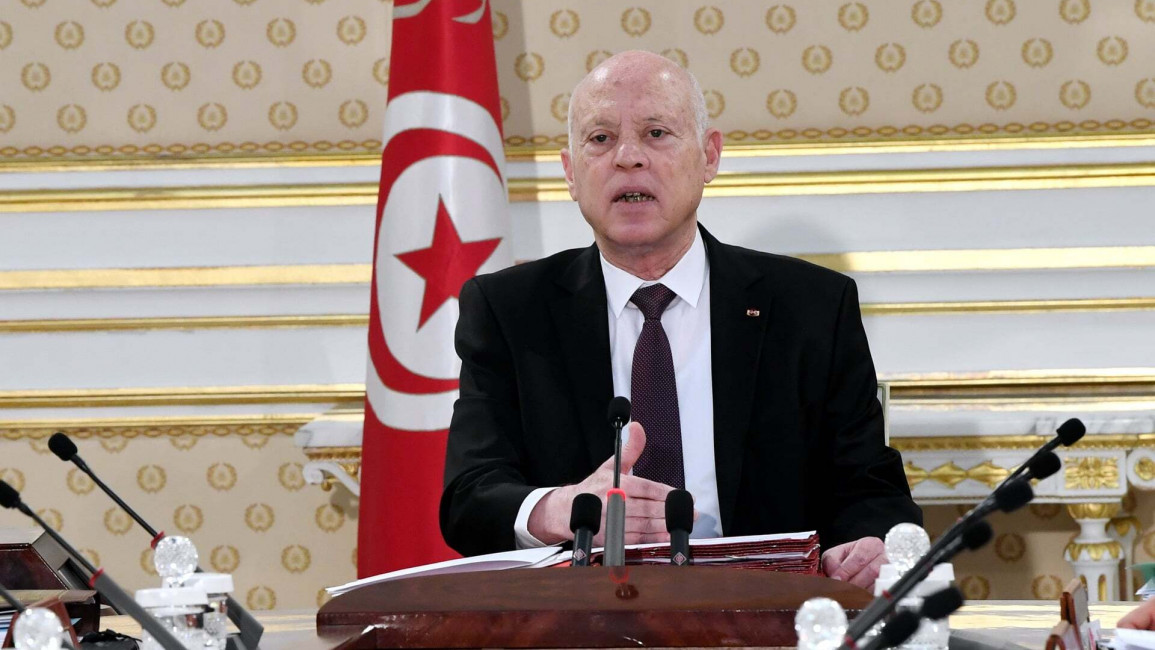Tunisia's Saied revives controversy with Libya over offshore oil field
Tunisian President Kais Saied has rekindled controversy over sharing an oil reserve with Libya forty years after the International Court of Justice settled the conflict in favour of Tripoli.
"Tunisia only got a few crumbs from the Bouri field. (...)The intention was to divide this field into two halves between Tunisia and Libya, which would secure all the needs of Tunisia and more," said President Saied on 16 March during his visit to the Tunisian Corporation for Petroleum Activities.
In a video shared on the presidency's Facebook page, the Tunisian president waded into the history of the Bouri oil field Libyan-Tunsian conflict, hinting that the International Court of Justice's (ICJ) 1982 decision was unjust.
Discovered in 1976, the Bouri oil field is located 120 kilometres north of the Libyan coast and produces about 23,000 barrels of oil every day.
The president's statements sparked widespread criticism from Libyan officials, amid fears that Siaed's controversial take would lead to a crisis with yet another neighbour and key trade partner of Tunisia: Libya.
Over the weekend, Libyan Oil and Gas Minister Mohammed Oun said the case of the Bouri oil field was already decided by a verdict from the International Court in 1982 in favour of Libya and that the ICJ's verdict was based on an agreement between the two countries.
He added that Libya's top leadership is set to respond to Saied's remarks.
In 1978, the two North African neighbours resorted to the International Court of Justice in The Hague after they failed to reach an amicable agreement over poly mineral rock deposits that included massive amounts of oil, gas, fish and mineral resources.
The legal battle ended in 1982 with Tunisia losing the case and a ruling granting Libya the right to exploit the "Bouri" offshore field.
At the time, the court indicated that the border between Libya and Tunisia must follow a line that begins from where the land border between the two countries meets the coast and extends to the sea for a distance of 12 nautical miles.
After this point, the boundary shall be marked by a line equidistant between the two nearest points on the coast of Libya and Tunisia. Both states accepted the ruling of the International Court of Justice and proceeded to implement it.
Though, energy experts see the new conversation on the Bouri field meaningless as "its exploitation is basically about to end, and its production rate does not exceed 30,000 barrels per day," according to Hamed El Matari, a former advisor at the Tunisian Ministry of Energy.
Today, Tunisia suffers from a high energy deficit as it records a yearly decrease in energy independence, according to data recently issued by the Energy Observatory government.
Tunisian energy experts say the political and economic hardships that swept the country in the last decade drove major energy investors to flee Tunisia.
"Tunisia could have been in a better position in terms of self-sufficiency, but the exhaustion of the sector and the flight of investors over the past ten years make the country vulnerable to all market shocks and high oil prices in the global market," Imad Darwish, a Tunisian energy expert, told Al-Araby Al-Jadeed, the Arabic-language sister publication to The New Arab.
Tunis is a small producer of oil and gas. Over the last year, it produced 10 billion barrels of petrol and 151 million cubic meters of gas.
This month, Tunisia's Ministry of Energy announced a 12-year plan worth 55 billion dinars (about US$17.7 billion) to develop fossil resources, accelerate new explorations in oil and gas, and provide over 70,000 job opportunities in the energy sector.


![Minnesota Tim Walz is working to court Muslim voters. [Getty]](/sites/default/files/styles/image_684x385/public/2169747529.jpeg?h=a5f2f23a&itok=b63Wif2V)




![Debris near Rafic Hariri International Airport [Getty]](/sites/default/files/styles/image_330x185/public/2176162423.jpeg?h=a5f2f23a&itok=MCSK9mkM)
![An Israeli air strike on Jabalia killed teenage journalist Hassan Hamad [Screengrab/X]](/sites/default/files/styles/image_212x120/public/2024-10/hassan%20hamad1.jpg?h=c12e0b96&itok=KstD_5xk)
